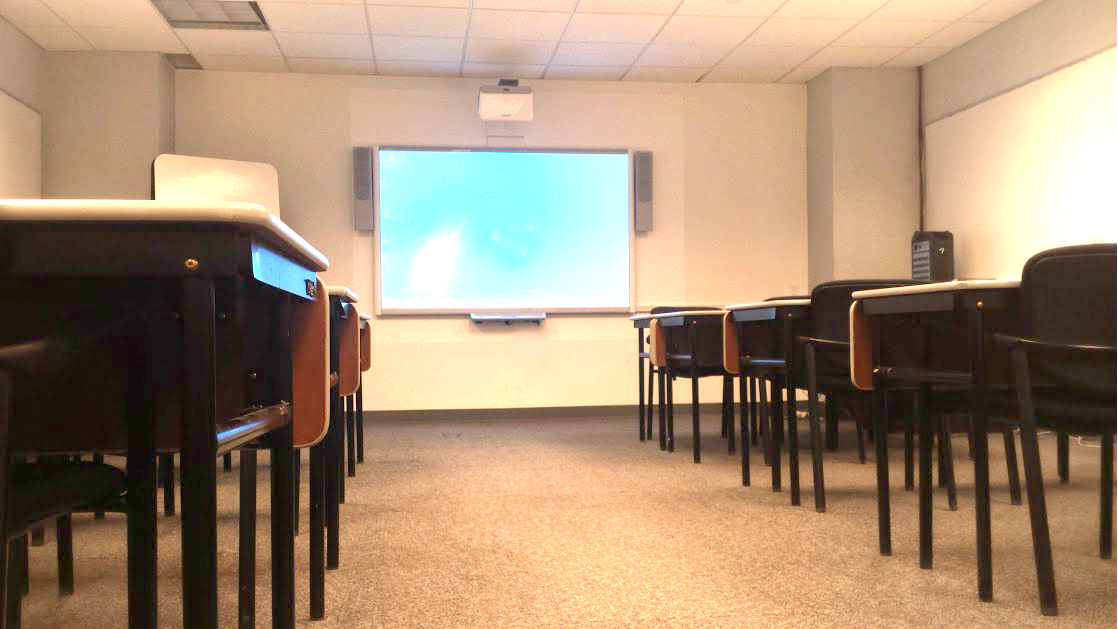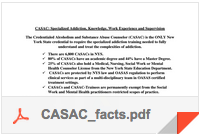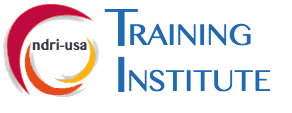Training
Are you a program administrator or clinical supervisor looking to arrange training for your staff to increase awareness and knowledge of a critical issue or to support adoption and implementation of an evidence-based practice? Are you an individual provider looking for training to promote your own professional development? Or, perhaps you need training for re-credentialing requirements? NDRI-USA has several training resources that can more than likely meet your needs and the needs of your staff. Click on the tabs below for more information.
 All health and human services providers are
welcome to participate in any of our training courses that are open for public registration.
All health and human services providers are
welcome to participate in any of our training courses that are open for public registration.
NDRI-USA has historically delivered training to a diverse group of providers including but not limited to prevention specialists, outreach workers, nurses, case managers, case management technicians, health educators, peer educators, drug treatment counselors, care coordinators, patient navigators, public health workers, mental health professionals, domestic violence counselors, probation officers, and drug court staff (i.e. judges, lawyers and officers).
Some of our currently funded projects have designated target training audiences in certain sectors of the workforce and therefore may not be open for general registration.
 Trainings that are offered through our funded grants and
contracts are generally offered to providers free of charge.
Trainings that are offered through our funded grants and
contracts are generally offered to providers free of charge.
Training requests that cannot be met within the scope of work of one of our funded projects will often incur costs for delivery. We will do our best to match your needs to existing resources in order to make training accessible to you and your staff.
 Most of our training courses are
certified by the Office of Alcoholism and Substance Abuse Services (OASAS) for CASAC re-credentialing
(typically not for initial credentialing), including for Credentialed Prevention Professionals (CPP) and
Credentialed Prevention Specialist (CPS). CEUs for other professionals could possibly be arranged.
Most of our training courses are
certified by the Office of Alcoholism and Substance Abuse Services (OASAS) for CASAC re-credentialing
(typically not for initial credentialing), including for Credentialed Prevention Professionals (CPP) and
Credentialed Prevention Specialist (CPS). CEUs for other professionals could possibly be arranged.
For more information:
Funder: Public Health Solutions (Contract 09-CTP-789)
Project Abstract: This program teaches the basics of care coordination to patient navigators, care coordinators, and program directors employed throughout the 27 Ryan White funded programs in NYC with an emphasis on intensive coordination of services for HIV+ patients and treatment adherence. Funded since 2009, NDRI-USA developed a 10-day care coordination training protocol to train program staff members on critical aspects related to Medical Case Management and specifically the Care Coordination Program. This 10-day curriculum is comprised of 18 modules intended to be delivered as face-to-face classroom training consisting of both didactic and skills building. In recent years, NDRI-USA has developed a 5-day curriculum comprised of the 6 modules viewed as most critical to care coordination as a shorter alternative to the protocol. NDRI-USA has also developed a Training-of-Trainers (ToT) for both the 5-day and 10-day curricula. In addition, a series of one-day care coordination trainings have been developed on specific topics related to Medical Case Management and Care Coordination including LGBT and cultural sensitivity, co-occurring mental health and substance use disorders, and documentation skills.
Funder: New York State Department of Health AIDS Institute (NYSDOHAI) (C027577)
Project Abstract: The Regional Training Center delivers training in the five boroughs (Manhattan, Bronx, Brooklyn, Queens, and Staten Island) to non-clinical health and human service providers working in the HIV/AIDS field. The trainings listed are intended for a wide variety of professionals and peers who offer HIV prevention to at risk individuals or health/social services to people living with HIV/AIDS. NYSDOH approved training curricula or training outlines are available for the following topic areas: Sex, Gender and HIV/STIs; Addressing Sexual Risk with Drug Users and Their Partners; Promoting Primary Care and Treatment Adherence for HIV Positive Individuals; Prevention with HIV Positive Persons; HIV and Viral Hepatitis; Enhanced Outreach; Behavioral Counseling; Case Management/Care Management; Harm Reduction; HIV Counseling, Testing, Referral and Partner Notification; Hepatitis C Screening; Integrated Screening for HIV and Hepatitis C; Promoting Sexual Health for Young MSM of Color; Aging and HIV, STIs and Viral Hepatitis; Managing Patients with Co-occurring Disorders of Substance Use, Mental Health & Trauma; Sexual Health and Gender Identity; and Health Insurance Coverage, which is inclusive of Medicare, Medicaid, Health Insurance Exchange, Health Care Reform, and Health Homes.
Links:To register for training through our RTC visit www.hivtrainingny.org
Funder: New York State Department of Health AIDS Institute (NYSDOHAI) (Contract #4350)
Project Abstract: The Center of Expertise on Co-Occurring Disorders offers specialized training related to the topic of managing patients with co-occurring disorders of substance use, mental health, and trauma. We offer trainings statewide via a mix of face-to-face trainings, webinars, and other emerging distance learning technologies, with specific locations for in-person training determined in concert with the AIDS Institute. The role of our Center of Expertise on Co-Occurring Disorders is to translate the latest findings, research and practice in area of co-occurring disorders into skills-building trainings to help further the capacity of non-physician health and human services providers to deliver prevention, screening, testing, support services, case and care management, and health care to persons living with or at risk of HIV, STIs or viral hepatitis.
Links:To register for training through our RTC visit www.hivtrainingny.org
Funder: New York State Department of Health AIDS Institute (NYSDOHAI) (Contract #4554)
Project Abstract: The Online Training Center translates existing and new training curriculum into interactive distance education and digital learning formats in order to expand the reach of training to non-physician and non-clinical health and human services providers. During this three-year project, NDRI-USA staff has developed (or is currently developing) the following online products:
Links:To access the HIV Viral Suppression: Partnerships for Success online course visit: www.health.ny.gov/diseases/aids/providers/training/online_training.htm
Funder: Substance Abuse and Mental Health Services Administration (SAMHSA)
Project Abstract: The Northeast and Caribbean Addiction Technology Transfer Center (NeC-ATTC) serves New York, New Jersey, Puerto Rico, and the U.S. Virgin Islands (HHS Region II). The NeC-ATTC joined the network in 2012 following the re-alignment of the HHS regions. The NeC-ATTC operates through a partnership between NDRI, NDRI-USA, and the Institute of Research, Education, and Services in Addiction (IRESA) at the Universidad Central Del Caribe (UCC), School of Medicine in Bayamon, Puerto Rico (the previous home of the Caribbean Basin and Hispanic ATTC since the network’s inception in 1993). Through the NeC-ATTC, staff provide innovative training and technical assistance to the addiction’s workforce employed in substance abuse treatment programs, mental health treatment programs, primary care, criminal justice, and HIV service organizations, focusing on a variety of topics related to the adoption and implementation of evidence-based and promising practices such as: Recovery Oriented Systems of Care (ROSC); service integration (i.e. the integration of mental health and substance abuse services and the integration of behavioral health and primary care services); Medication Assisted Treatment (MAT); Trauma Informed Care; Motivational Interviewing; HIV/HCV prevention, testing and treatment; clinical supervision; treatment planning; and cultural competence. Training and technical assistance is provided via a number of mediums/approaches (e.g., face-to-face workshops, webinars, e-learning products, learning communities, etc.).
Links: For more information visit: ATTC Network Website and NeC-ATTC Regional Website
Funder: Substance Abuse and Mental Health Services Administration (SAMHSA)
Project Abstract: This YMSM+LGBT CoE will provide training and technical assistance to decrease the rate of substance abuse and new HIV infections among racial/ethnic minority YMSM (ages 18-29), and to provide culturally responsive prevention and treatment services for the LGBT population dealing with co-occurring substance use and mental health disorders. Given the very high incidence and prevalence rates of HIV among YMSM of color, this CoE responds to the pressing public health need to develop and disseminate effective prevention/treatment approaches specifically tailored to this population. The YMSM+LGBT CoE will have responsibility for training/TA nationwide, and project activities will include: 1) identification of a cadre of subject matter experts who will serve on a National Advisory Board to inform CoE activities; 2) development and implementation of a three-year strategic plan to ensure that the range of issues facing racial/ethnic minority YMSM and other LGBT communities are addressed; 3) develop and maintain a project website to serve as an inventory/clearinghouse of evidence-based/promising practices and resources that have been developed to serve the YMSM and LGBT communities; 4) update the training curriculum, “A Provider’s Introduction to Substance Abuse Treatment for LGBT Individuals (2007)” to include the specific needs of minority YMSM, and to update current research findings and information; 5) develop new research-based products/curricula that incorporate instructional design and dissemination methods that are culturally responsive to the population; 6) conduct ToT sessions across the country on the revised and new curricula to ensure dissemination; and 7) organize regional and national summits/seminars/conferences on YMSM and other LGBT populations to gather input from experts and the YMSM/LGBT communities and to share CoE developments.
Links: Currently in development.
Funder: New York State Unified Court System (Contract #C100701)
Project Abstract: Brooklyn Treatment Court (BTC) provides an intensive 90 day residential rehabilitation program with an optional administration of Vivitrol for participants whose primary drug of choice is alcohol or opiates. Participants are referred to this treatment program by the presiding Judge, following consultation with case managers and program staff. BTC subcontracted Samaritan Village to provide treatment services and NDRI-USA has been contracted to provide an evaluation of this program. Evaluation activities include collection and analysis of both quantitative and qualitative data. Quantitative data come from: the BTC database (the Uniform Treatment Assessment, UTA, used by all drug courts in New York State); the Government Performance Reporting Act (GPRA) tool, developed by SAMHSA and required for all SAMHSA-funded projects; and data provided by Samaritan Village. Qualitative Data come from semi-structured interviews conducted with program staff, court staff, and participants. The purpose of this evaluation is to determine what works, what doesn’t work and to use this information to inform program improvements.
Links: For more information click here
Funder: National Drug Court Institute
Project Abstract: The Training Institute of the National Development & Research Institutes-USA (NDRI-USA) developed and trains African America n or Latino centric versions of, ‘Cultural Proficiency in Drug Court Practice,’ curriculum. This interactive training contains the core components of cultural proficiency and correlates culture specific information of the desired version throughout the delivery. This training provides a cultural proficiency modality for practice, pre & post training evaluations, and assessment tools to be used for sustainability. This skills building team training is designed to instruct on Family, Juvenile, and/or Adult court teams on agency-level, (treatment services and justice system) and systems-level (client and drug court practitioner) issues of cultural proficiency. Participants are judges, public defenders, prosecutors, probation officers, parole officers, behavioral health providers (substance abuse and mental health workers) and other treatment and criminal justice practitioners.
Links: For more information click here
Funder: New York State Health Foundation
Project Abstract: Through the New York State Health Foundation’s Center for Excellence in Integrated Care (CEIC), NDRI staff worked directly (i.e. on site) with 603 licensed outpatient mental health (Office of Mental Health [OMH]) and substance abuse (Office of Alcoholism and Substance Abuse Services [OASAS]) treatment programs in New York State to foster the integration of substance abuse and mental health services. CEIC’s approach to technical assistance (TA) involved a series of activities that collectively were intended to build staff competencies and program capacity to provide effective, high quality care to people with COD; including: (a) engagement of (program, county and State) leadership (e.g., SSAs, treatment providers and consumer advocates) initially to assess training/TA needs; (b) program-level assessment of COD capability using established tools such as the Dual Diagnosis Capability in Addiction Treatment (DDCAT) and Dual Diagnosis Capability in Mental Health Treatment (DDCMHT) indices; (c) provision of program-specific reports based on DDCA[MH]T results, offering a series of recommendations intended to guide providers toward improving the integration of services for COD clients; (d) linkage to training/TA resources like webinars, curricula, workshops, in-service trainings (TIPs), manuals and informational resources (e.g., research findings, reports, fact sheets); (e) workshops to promote development of implementation plans for the purpose of advancing COD capability, with an emphasis on recovery oriented, person-centered, culturally competent services; (f) formation of Learning Communities to promote sustainability via peer-to-peer learning; and (g) development of implementation resources such as the “Quick Guide to Building Capability,” program guidelines for COD “capable” and “enhanced” care, and a training resource guide.
Links: For more information click here
Downloads: CEIC Final Report
Co-Occurring Disorders Resource Guide
Co-Occurring Capability Implementation Guide
CEIC Quick Guide – “Getting to Capable”
CEIC Quick Guide – “Getting to Enhanced”
Dual Diagnosis Capability in Addiction Treatment (DDCAT) Index
Dual Diagnosis Capability in Mental Health Treatment (DDCMHT) Index
Publications:
NDRI-USA is widely considered as a leader on public
health issues, including:

Many courses we offer relate to these specific issues, however, our senior trainers are from diverse professional backgrounds, have worked with numerous vulnerable populations, and have trained in countless topic areas.

Many courses we offer relate to these specific issues, however, our senior trainers are from diverse professional backgrounds, have worked with numerous vulnerable populations, and have trained in countless topic areas.

NDRI-USA has historically delivered training to a diverse group of providers including but not limited to prevention specialists, outreach workers, nurses, case managers, case management technicians, health educators, peer educators, drug treatment counselors, care coordinators, patient navigators, public health workers, mental health professionals, domestic violence counselors, probation officers, and drug court staff (i.e. judges, lawyers and officers).
Some of our currently funded projects have designated target training audiences in certain sectors of the workforce and therefore may not be open for general registration.

Training requests that cannot be met within the scope of work of one of our funded projects will often incur costs for delivery. We will do our best to match your needs to existing resources in order to make training accessible to you and your staff.
Currently, our Northeast and Caribbean Addiction Technology
Transfer Center (NeC-ATTC) offers training in New York, New Jersey, Puerto Rico and the U.S. Virgin
Islands.
Many of the training events offered through the NeC-ATTC are open for registration to the provider workforce in these States and Territories. Some courses are tailored to meet the specific request of an organization. For more information on ATTC training events, please click on the ATTC logo:
Many of the training events offered through the NeC-ATTC are open for registration to the provider workforce in these States and Territories. Some courses are tailored to meet the specific request of an organization. For more information on ATTC training events, please click on the ATTC logo:

For more information:

HIV Care Coordination Training Program
Current Term: March 1, 2015 through February 28, 2015Funder: Public Health Solutions (Contract 09-CTP-789)
Project Abstract: This program teaches the basics of care coordination to patient navigators, care coordinators, and program directors employed throughout the 27 Ryan White funded programs in NYC with an emphasis on intensive coordination of services for HIV+ patients and treatment adherence. Funded since 2009, NDRI-USA developed a 10-day care coordination training protocol to train program staff members on critical aspects related to Medical Case Management and specifically the Care Coordination Program. This 10-day curriculum is comprised of 18 modules intended to be delivered as face-to-face classroom training consisting of both didactic and skills building. In recent years, NDRI-USA has developed a 5-day curriculum comprised of the 6 modules viewed as most critical to care coordination as a shorter alternative to the protocol. NDRI-USA has also developed a Training-of-Trainers (ToT) for both the 5-day and 10-day curricula. In addition, a series of one-day care coordination trainings have been developed on specific topics related to Medical Case Management and Care Coordination including LGBT and cultural sensitivity, co-occurring mental health and substance use disorders, and documentation skills.
Regional Training Center
Current Term: October 1, 2014 through March 31, 2015Funder: New York State Department of Health AIDS Institute (NYSDOHAI) (C027577)
Project Abstract: The Regional Training Center delivers training in the five boroughs (Manhattan, Bronx, Brooklyn, Queens, and Staten Island) to non-clinical health and human service providers working in the HIV/AIDS field. The trainings listed are intended for a wide variety of professionals and peers who offer HIV prevention to at risk individuals or health/social services to people living with HIV/AIDS. NYSDOH approved training curricula or training outlines are available for the following topic areas: Sex, Gender and HIV/STIs; Addressing Sexual Risk with Drug Users and Their Partners; Promoting Primary Care and Treatment Adherence for HIV Positive Individuals; Prevention with HIV Positive Persons; HIV and Viral Hepatitis; Enhanced Outreach; Behavioral Counseling; Case Management/Care Management; Harm Reduction; HIV Counseling, Testing, Referral and Partner Notification; Hepatitis C Screening; Integrated Screening for HIV and Hepatitis C; Promoting Sexual Health for Young MSM of Color; Aging and HIV, STIs and Viral Hepatitis; Managing Patients with Co-occurring Disorders of Substance Use, Mental Health & Trauma; Sexual Health and Gender Identity; and Health Insurance Coverage, which is inclusive of Medicare, Medicaid, Health Insurance Exchange, Health Care Reform, and Health Homes.
Links:To register for training through our RTC visit www.hivtrainingny.org
Center of Expertise for Co-Occurring Disorders
Current Term: April 1, 2014 through March 31, 2015Funder: New York State Department of Health AIDS Institute (NYSDOHAI) (Contract #4350)
Project Abstract: The Center of Expertise on Co-Occurring Disorders offers specialized training related to the topic of managing patients with co-occurring disorders of substance use, mental health, and trauma. We offer trainings statewide via a mix of face-to-face trainings, webinars, and other emerging distance learning technologies, with specific locations for in-person training determined in concert with the AIDS Institute. The role of our Center of Expertise on Co-Occurring Disorders is to translate the latest findings, research and practice in area of co-occurring disorders into skills-building trainings to help further the capacity of non-physician health and human services providers to deliver prevention, screening, testing, support services, case and care management, and health care to persons living with or at risk of HIV, STIs or viral hepatitis.
Links:To register for training through our RTC visit www.hivtrainingny.org
Online Training Center
Current Term: April 1, 2014 through March 31, 2015Funder: New York State Department of Health AIDS Institute (NYSDOHAI) (Contract #4554)
Project Abstract: The Online Training Center translates existing and new training curriculum into interactive distance education and digital learning formats in order to expand the reach of training to non-physician and non-clinical health and human services providers. During this three-year project, NDRI-USA staff has developed (or is currently developing) the following online products:
-
HIV Viral Suppression: Partnerships for Success - This one-hour on-line training describes how HIV treatment adherence and retention in care are strongly linked with achieving viral suppression, improved health outcomes for people with HIV, and how non-physician health and human services providers can play a role in linking clients to HIV care, promoting client retention in care and supporting HIV treatment adherence.
Motivational Interviewing: A tool for Linkage & Retention in Care for Clients with HIV/STIs/HCV - This four module on-line training introduces non-clinical service providers to Motivational Interviewing techniques and skills that can be used to promote linkage and retention in care. Module 1 describes why it’s important for clients living with HIV/STIs/HCV to be linked to medical care and provides an overview of Motivational Interviewing and how it can be used to link and retain clients in care. Module 2 introduces the “essential elements” of MI. Module 3 provides a deeper exploration of “Change Talk” and “Sustain Talk.” Module 4 identifies the Core Skills represented by the acronym OARS. Each module is twenty minutes in length, contains interactive “reinforcement” opportunities, and concludes with a summary review. This course is currently in development and should be available by April 1, 2015.
Promoting Positive Health Outcomes for People Living with HIV, Sexually Transmitted Infections, and Viral Hepatitis in the Age of Effective Treatments - This four-module interactive e-learning training focuses on four health challenges (aging, substance use, mental health, and HCV) and what non-clinical providers can do to promote positive health outcomes. It addresses the reality that we are now living in a time when effective treatments exist to successfully manage HIV and cure Viral Hepatitis. Clinical evidence proves that HIV viral suppression can increase life span and reduce transmission of the virus. Despite these advances many people aren’t tested, don’t get into care or fall out of care. Non-clinical providers play a crucial role in linkage and retention in care. Each of the four training modules will look at one health challenge and outline actions non-clinical providers can take to address them. This course is currently in development and should be available in 2015.
Links:To access the HIV Viral Suppression: Partnerships for Success online course visit: www.health.ny.gov/diseases/aids/providers/training/online_training.htm
Northeast & Caribbean Addiction Technology Transfer Center (NeC-ATTC)
Current Term: September 30, 2012 through September 29, 2017Funder: Substance Abuse and Mental Health Services Administration (SAMHSA)
Project Abstract: The Northeast and Caribbean Addiction Technology Transfer Center (NeC-ATTC) serves New York, New Jersey, Puerto Rico, and the U.S. Virgin Islands (HHS Region II). The NeC-ATTC joined the network in 2012 following the re-alignment of the HHS regions. The NeC-ATTC operates through a partnership between NDRI, NDRI-USA, and the Institute of Research, Education, and Services in Addiction (IRESA) at the Universidad Central Del Caribe (UCC), School of Medicine in Bayamon, Puerto Rico (the previous home of the Caribbean Basin and Hispanic ATTC since the network’s inception in 1993). Through the NeC-ATTC, staff provide innovative training and technical assistance to the addiction’s workforce employed in substance abuse treatment programs, mental health treatment programs, primary care, criminal justice, and HIV service organizations, focusing on a variety of topics related to the adoption and implementation of evidence-based and promising practices such as: Recovery Oriented Systems of Care (ROSC); service integration (i.e. the integration of mental health and substance abuse services and the integration of behavioral health and primary care services); Medication Assisted Treatment (MAT); Trauma Informed Care; Motivational Interviewing; HIV/HCV prevention, testing and treatment; clinical supervision; treatment planning; and cultural competence. Training and technical assistance is provided via a number of mediums/approaches (e.g., face-to-face workshops, webinars, e-learning products, learning communities, etc.).
Links: For more information visit: ATTC Network Website and NeC-ATTC Regional Website
ATTC Center of Excellence for YMSM and Other LGBT Populations
Current Term: September 30, 2014 through September 29, 2017Funder: Substance Abuse and Mental Health Services Administration (SAMHSA)
Project Abstract: This YMSM+LGBT CoE will provide training and technical assistance to decrease the rate of substance abuse and new HIV infections among racial/ethnic minority YMSM (ages 18-29), and to provide culturally responsive prevention and treatment services for the LGBT population dealing with co-occurring substance use and mental health disorders. Given the very high incidence and prevalence rates of HIV among YMSM of color, this CoE responds to the pressing public health need to develop and disseminate effective prevention/treatment approaches specifically tailored to this population. The YMSM+LGBT CoE will have responsibility for training/TA nationwide, and project activities will include: 1) identification of a cadre of subject matter experts who will serve on a National Advisory Board to inform CoE activities; 2) development and implementation of a three-year strategic plan to ensure that the range of issues facing racial/ethnic minority YMSM and other LGBT communities are addressed; 3) develop and maintain a project website to serve as an inventory/clearinghouse of evidence-based/promising practices and resources that have been developed to serve the YMSM and LGBT communities; 4) update the training curriculum, “A Provider’s Introduction to Substance Abuse Treatment for LGBT Individuals (2007)” to include the specific needs of minority YMSM, and to update current research findings and information; 5) develop new research-based products/curricula that incorporate instructional design and dissemination methods that are culturally responsive to the population; 6) conduct ToT sessions across the country on the revised and new curricula to ensure dissemination; and 7) organize regional and national summits/seminars/conferences on YMSM and other LGBT populations to gather input from experts and the YMSM/LGBT communities and to share CoE developments.
Links: Currently in development.
Evaluation of Brooklyn Treatment Court/Samaritan Village 90-Day Residential Program
Current Term: April 1, 2014 through March 31, 2017Funder: New York State Unified Court System (Contract #C100701)
Project Abstract: Brooklyn Treatment Court (BTC) provides an intensive 90 day residential rehabilitation program with an optional administration of Vivitrol for participants whose primary drug of choice is alcohol or opiates. Participants are referred to this treatment program by the presiding Judge, following consultation with case managers and program staff. BTC subcontracted Samaritan Village to provide treatment services and NDRI-USA has been contracted to provide an evaluation of this program. Evaluation activities include collection and analysis of both quantitative and qualitative data. Quantitative data come from: the BTC database (the Uniform Treatment Assessment, UTA, used by all drug courts in New York State); the Government Performance Reporting Act (GPRA) tool, developed by SAMHSA and required for all SAMHSA-funded projects; and data provided by Samaritan Village. Qualitative Data come from semi-structured interviews conducted with program staff, court staff, and participants. The purpose of this evaluation is to determine what works, what doesn’t work and to use this information to inform program improvements.
Links: For more information click here
Cultural Proficiency in Drug Court Practice Program
Term: January 1, 2014 through December 31, 2014Funder: National Drug Court Institute
Project Abstract: The Training Institute of the National Development & Research Institutes-USA (NDRI-USA) developed and trains African America n or Latino centric versions of, ‘Cultural Proficiency in Drug Court Practice,’ curriculum. This interactive training contains the core components of cultural proficiency and correlates culture specific information of the desired version throughout the delivery. This training provides a cultural proficiency modality for practice, pre & post training evaluations, and assessment tools to be used for sustainability. This skills building team training is designed to instruct on Family, Juvenile, and/or Adult court teams on agency-level, (treatment services and justice system) and systems-level (client and drug court practitioner) issues of cultural proficiency. Participants are judges, public defenders, prosecutors, probation officers, parole officers, behavioral health providers (substance abuse and mental health workers) and other treatment and criminal justice practitioners.
Links: For more information click here
Center for Excellence in Integrated Care (CEIC)
Term: November 1, 2008 through October 31, 2013Funder: New York State Health Foundation
Project Abstract: Through the New York State Health Foundation’s Center for Excellence in Integrated Care (CEIC), NDRI staff worked directly (i.e. on site) with 603 licensed outpatient mental health (Office of Mental Health [OMH]) and substance abuse (Office of Alcoholism and Substance Abuse Services [OASAS]) treatment programs in New York State to foster the integration of substance abuse and mental health services. CEIC’s approach to technical assistance (TA) involved a series of activities that collectively were intended to build staff competencies and program capacity to provide effective, high quality care to people with COD; including: (a) engagement of (program, county and State) leadership (e.g., SSAs, treatment providers and consumer advocates) initially to assess training/TA needs; (b) program-level assessment of COD capability using established tools such as the Dual Diagnosis Capability in Addiction Treatment (DDCAT) and Dual Diagnosis Capability in Mental Health Treatment (DDCMHT) indices; (c) provision of program-specific reports based on DDCA[MH]T results, offering a series of recommendations intended to guide providers toward improving the integration of services for COD clients; (d) linkage to training/TA resources like webinars, curricula, workshops, in-service trainings (TIPs), manuals and informational resources (e.g., research findings, reports, fact sheets); (e) workshops to promote development of implementation plans for the purpose of advancing COD capability, with an emphasis on recovery oriented, person-centered, culturally competent services; (f) formation of Learning Communities to promote sustainability via peer-to-peer learning; and (g) development of implementation resources such as the “Quick Guide to Building Capability,” program guidelines for COD “capable” and “enhanced” care, and a training resource guide.
Links: For more information click here
Downloads: CEIC Final Report
Co-Occurring Disorders Resource Guide
Co-Occurring Capability Implementation Guide
CEIC Quick Guide – “Getting to Capable”
CEIC Quick Guide – “Getting to Enhanced”
Dual Diagnosis Capability in Addiction Treatment (DDCAT) Index
Dual Diagnosis Capability in Mental Health Treatment (DDCMHT) Index
Publications:
- Chaple, M. & Sacks, S. (2014). The impact of technical assistance and implementation support on program
capacity to deliver integrated services. Journal of Behavioral Health Services Research.
http://www.ncbi.nlm.nih.gov/pubmed/24928534
Chaple, M., Sacks, S., Melnick, G., McKendrick, K. & Brandau, S. (2013). The predictive validity of the Dual Diagnosis Capability in Addiction Treatment (DDCAT) index. Journal of Dual Diagnosis, 9(2); 171-78.
http://www.tandfonline.com/doi/abs/10.1080/15504263.2013.779128#preview
Sacks, S. Chaple, M. Sirkantraporn, J., Sacks, J.Y., Knickman, J. & Martinez, J. (2013). Improving the Capability to provide integrated mental health and substance abuse services in a state system of outpatient care. Journal of Substance Abuse Treatment, 44(5): 288-93.
http://www.ncbi.nlm.nih.gov/pubmed/23317513


